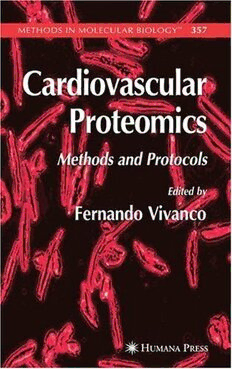
Cardiovascular Proteomics: Methods and Protocols PDF
438 Pages·2007·6.351 MB·English
Most books are stored in the elastic cloud where traffic is expensive. For this reason, we have a limit on daily download.
Preview Cardiovascular Proteomics: Methods and Protocols
Description:
Over the past few years, the power and potential of proteomics has become widely recognized. The use of proteomics for the study of complex diseases is increasing and is particularly applicable to cardiovascular disease, the leading cause of death in developed countries. The ability to investigate the complete proteome provides a critical tool toward elucidating the complex and multif- torial basis of cardiovascular biology, especially disease processes. Proteomics involves the integration of a number of technologies with the aim of analyzing all the proteins expressed by a biological system in response to various stimuli under different pathophysiological conditions. The proteomic approach offers the ability to evaluate simultaneously the changes in protein expression and cell signaling pathways in response to such conditions as atherosclerosis, c- diac hypertrophy, stroke, or heart failure. Cardiovascular Proteomics: Methods and Protocols covers many of the above aspects of the proteomic approach in the cardiovascular field. This v- ume takes the reader through the complete process of proteomic analysis, from the obtention of specific heart proteins (troponin I) to the new techniques of identifying risk biomarkers of atherome plaque rupture, analyzing the secretome of explanted endarterectomies cultured in vitro, or the application of phage display techniques to decipher the molecular diversity of blood vessels.
See more
The list of books you might like
Most books are stored in the elastic cloud where traffic is expensive. For this reason, we have a limit on daily download.
